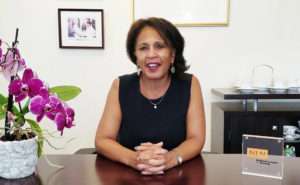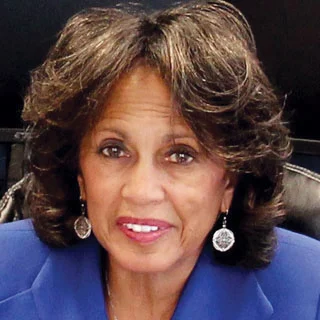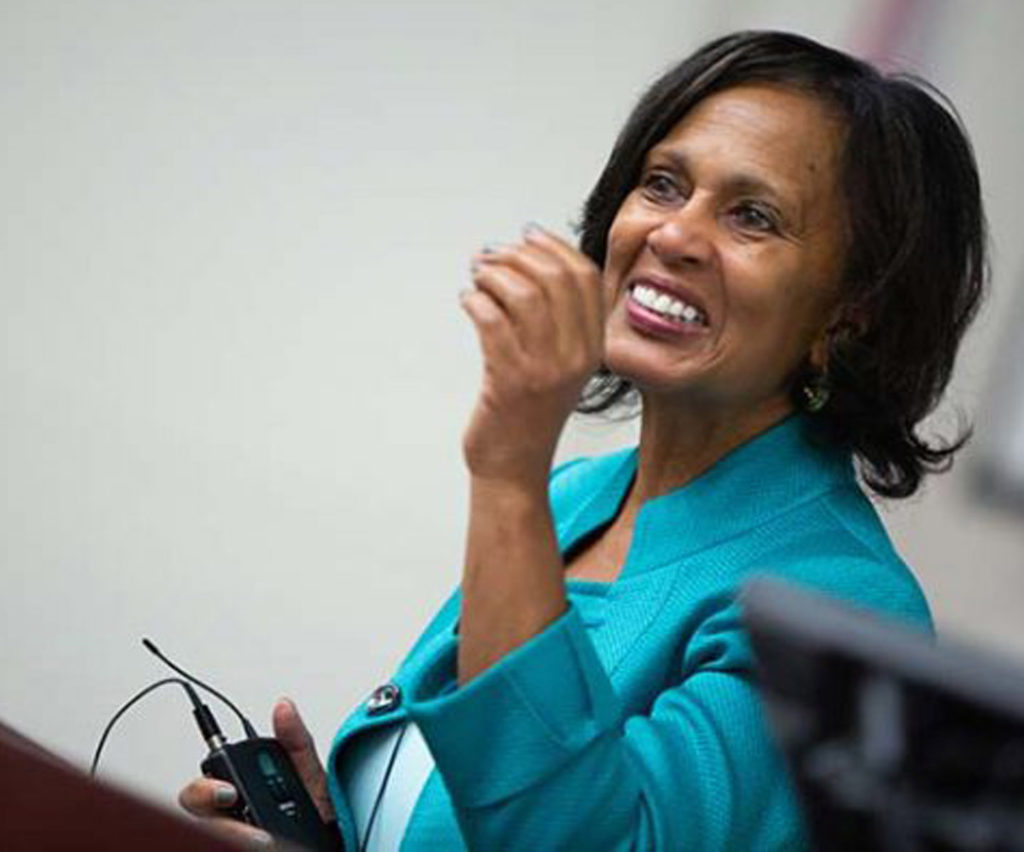There are 4.8 million nurses in the United States today and the U.S. government predicts 1 million new nursing jobs over the next five years. That makes nursing the nation’s largest healthcare profession. Astonishingly, the woman who leads this enormous cohort, Dr. Beverly Malone, never even dreamed of having a career, let alone becoming CEO and President of the National League for Nursing.
“When I was younger,” Malone says with a laugh, “I wanted nothing but to graduate from college, and to be able to have a washer and dryer.”
She certainly never anticipated serving her country as the Deputy Assistant Secretary of Health under President Bill Clinton, or serving as President of the American Nurses Association or General Secretary for the UK’s Royal College of Nursing.
 Growing up in segregated Kentucky, Malone didn’t think big. Although her girlhood ambitions included higher education, nursing wasn’t her dream nor her expectation for her future. As the eldest of seven children, caring for others came naturally, but Malone’s modest ambitions were to follow in her grandmother’s footsteps — an unofficial healer and health care worker in the black community.
Growing up in segregated Kentucky, Malone didn’t think big. Although her girlhood ambitions included higher education, nursing wasn’t her dream nor her expectation for her future. As the eldest of seven children, caring for others came naturally, but Malone’s modest ambitions were to follow in her grandmother’s footsteps — an unofficial healer and health care worker in the black community.
However, Malone is one of those rare people who has taken something positive from almost everyone she has met along her journey. “I was fortunate to cross paths with so many people who saw things in me that I didn’t see in myself, who saw leadership in me, as well as advocacy.”
For starters, Malone recalls her fourth-grade teacher who told her she was smart like her mom and grandma. That teacher had taught all three of them, plus they attended the same church. “I saw her every Sunday and she reinforced my confidence in my intelligence.”
Two years later, a second teacher made an impression on her. “Up to the sixth grade,” Malone says, “all my teachers were black. And then at the sixth grade we integrated the schools in Kentucky. So I went into a school that had mostly white teachers, and one of my white teachers taught me English. She saw something in me, she anticipated that I could have a big career.”
Even when Malone graduated from her elementary program and went to high school, that teacher would meet her in the city courtyard and look at her report card. “She would give me money rewards,” she says. “50 cents for every A that I got. In the eleventh grade, she was still looking at my report card.”
“I was always amazed,” Malone adds, “because although I had good grades, I loved to study. I enjoyed it. It was not like a hardship, it was something that I totally, totally enjoyed, so I never quite understood why people were so interested in me.”
But the interest and encouragement she received as a young girl was just the beginning. Malone says she has been blessed to have mentors at every step in her career.
“I’m a psychiatric mental health nurse, so I have those who are psychiatric mental health nurses. I’m a clinical psychologist so I have mentors who are clinical psychologists. I have mentors for every part of who I am and what I want to be.”
While many view climbing the career ladder as a race to the top, Malone has taken a bigger view — the importance of women helping women— instilled by all the wonderful mentors in her life.
“When you receive so much,” she says, “how can you dare not give back?”
Her many guides taught her the impact a good leader can make and gave Malone her own personal mantra: Purpose, power, and passion. The three P’s.
“You need a purpose,” Malone says. “You need a focus, you need a Northstar, you need a sense of where you’re going. And you need to lead.”
The power aspect, Malone says, is the one women seem to struggle with the most. “Female executives are often caught in a balancing act between being too amenable and too assertive, something that men don’t have to take into account.” Malone defines power as being able to move an object from point A to point B, or to implement the actions that turn a goal into reality.
Part of this power, Malone says, is realizing that you don’t need to be a one-woman show. Transitioning from clinician to executive, she went from caring for patients herself to educating other nurses to do the same. Though her experience may have become less hands-on, she knew that accomplishing her overall goal of providing quality care was worth far more important than any individual feat.
 “My job is to help patients move out of that hospital system to a healthy place,” Malone says. “Is Bev Malone the only one to do it? Absolutely not. I can do it through others, and that’s the true meaning of leadership. My focus needs to be how can I transform what I do and share it with as many people as possible. If you’re any kind of leader worth your salt, you will work through other people.”
“My job is to help patients move out of that hospital system to a healthy place,” Malone says. “Is Bev Malone the only one to do it? Absolutely not. I can do it through others, and that’s the true meaning of leadership. My focus needs to be how can I transform what I do and share it with as many people as possible. If you’re any kind of leader worth your salt, you will work through other people.”
The last “P,” passion, she says is inner inspiration that springs from one’s core. “The people that we serve, they know when you really care — caring promotes health healing and hope in response to the human condition, and so it’s not just inspiring the nurses, it’s inspiring the people we serve,” Malone says.
Despite her success, she is also quick to say that the climb hasn’t been easy. She recalls the feelings of self-doubt that plagued when she was back at the University of Cincinnati. “I kept thinking, I wonder if somebody is going to tap me on the shoulder and say, ‘Hey, I don’t know how you got in, but you’re not supposed to be here,” Malone says.
But as time went on, she gained confidence. She internalized the ‘fake it ‘till you make it’ mentality and used this to validate her high standings. “I don’t know when self-doubt left me, but at some point it must be like some kind of little bug that decided to jump off and say ‘you have done so many different things with your life that you didn’t even know were possible… that this thing is bigger than you,” Malone says. “Understand that you’re here for a bigger purpose than you even understand.”
At the start of her doctoral program, Malone was faced with a new obstacle: juggling her education while caring for her two young children — a newborn and a toddler. While she says it was one of the most difficult periods of her life, she was afraid that if she withdrew from school, she might never re-enter. She laughs as she recalls nursing her three-month-old son in her psychology class. “As women, we are so good at taking care of business, and that’s what I love about being a woman.” Malone says. “We conquer things that nobody else will even try to tackle.”
Though she admits that it can be difficult to maintain her defining-optimism, especially during a global pandemic, Malone stresses the importance of surrounding yourself with positive people that want to see you succeed, and an end goal that you believe in.
And, while being a “first” is exciting, her priority as a pioneer is ensuring that she is not the last. “My obligation is to make sure the door remains open, that I don’t close it behind another person, another woman, another nurse,” Malone says. “That I make sure I say to them, there’s plenty of room here. I don’t have to be the only one. Come on in.”
As she reflects on her past obstacles, obstacles that would have been roadblocks to most, her positivity radiates even through a small, pixelated Zoom screen. “You can never be defeated,” Malone says, “You can be delayed, but you can’t be defeated.”
“The National League for Nursing boasts a remarkable past, an exceptional present, and a shared, transformative future. With purpose, power, and passion, we bring the League’s mission and core values to life.”
Beverly Malone, PhD, RN, FAAN
President & CEO, National League for Nursing
Dedicated to excellence in nursing, the National League for Nursing is the premier organization for nurse faculty and leaders in nursing education. The NLN offers professional development, networking opportunities, testing services, nursing research grants, and public policy initiatives to its 40,000 individual and 1,200 institutional members. NLN members represent nursing education programs across the spectrum of higher education, health care organizations, and agencies. National League for Nursing – Membership Association for Nurse Educators Washington, DC (nln.org)
What Can You Do With a Nursing Degree Besides Nursing?
Professionals with training and experience in nursing can find fulfilling work in a variety of related career paths. In this section, we provide brief overviews of six potential new career tracks, including education requirements, applicable skills, and salary information. These jobs are in several industries, such as health and nutrition, social work, public health, education, research, and counseling.
Pharmaceutical Sales
Professional pharmaceutical sales representatives communicate directly with doctors and other healthcare specialists who prescribe medications to introduce new pharmaceutical products to the market. Sales representatives with nursing experience understand the necessary medical terminology and communication standards for hospital and clinical settings.
These professionals typically possess a working knowledge of pharmacology, common side effects, and relevant histories of the pharmaceutical products they sell. Educational requirements for these roles vary based on the products and employers. Many roles in the area require applicants to hold at least a bachelor’s degree.
Salary: $63,000
Administrative Services Manager
Some popular alternatives to nursing jobs include administrative services roles. Managers in these positions are organized leaders who can delegate responsibilities, understand workflow and business operations, and supervise personnel. Professionals with training un nursing often find work as administrative services managers in healthcare and social assistance facilities or educational services.
Administrative service managers’ responsibilities vary and relate to their areas of expertise and industry. Entry-level careers in this field typically require a bachelor’s degree and related work experience.
Salary: $96,940
Medical and Health Service Managers
Alternative careers for nurses also include roles as medical and health service managers. Sometimes referred to as healthcare executives or healthcare administrators, nurses use their knowledge of healthcare services, health laws and regulations, patient fees and billing and medical budgeting to carry out these supervisory roles.
Approximately 33% of these professionals work in hospitals and clinics. Most medical and health service managers need at least a bachelor’s degree, although degree and experience requirements may vary among facilities.
Salary: $100,980
Speech-Language Pathologist
Nurses often enjoy working as speech-language pathologists because of the close interaction with clients. They diagnose and treat children and adults suffering from various speech production issues, such as those caused by brain injuries, stroke, hearing loss and autism, Professionals in this field typically need a master’s degree for entry-level careers. Applicants for the appropriate master’s program may come from outside fields, such as nursing. Most states also require licensure to practice, although requirements vary among locations.
Salary: $79,120
Physical Therapist
One of the most common career changes for nurses is a move into physical therapy. These professionals develop ways to help ill or injured people improve physical mobility and manage their pain levels. Nurses do well in this profession, especially since physical therapists often work in clinics, hospitals and private offices. Physical therapists usually need a doctor of physical therapy degree to practice in addition to the appropriate licensure. The Bureau of Labor Statistics projects a bright outlook for careers in this area, with an expected 22% growth from 2018-28.
Salary: $89,440
Medical Scientists
Alternative nursing jobs away from the bedside also include medical scientists. These professionals often possess a medical degree or a Ph.D. in biology or related hard science fields. Nurses in this alternative career track engage in a variety of investigative and research-focused practices, including the study of diseases, drug potency and manufacturing, and new medical devices. Medical scientists typically work in research and development facilities, colleges and universities or hospitals and clinics.
Salary: $88,780
Bureau of Labor Statistics, U.S. Department of Labor, Occupational Outlook Handbook, Registered Nurses at https://www.bls.gov/ooh/healthcare/registered-nurses.htm (visited 10/28/21)
Consider a Specialty Career in Nursing…

Jamie Fischer was an intern at womensbiz.US this past summer. Now she’s back at Lehigh University as a Junior pursuing a Bachelor of Arts degree in Journalism and Psychology. At womensbiz, she created content for this, our inaugural issue, truly using her course learning, extracurricular work on the Lehigh student newspaper and impressive internships in journalism in the New York area.

